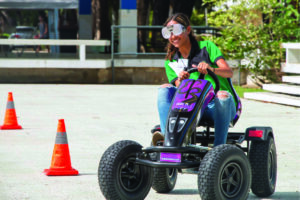
Opinion by Julie Dostal, PH.D.
Prevention comes in many forms for LEAF
Prevention is a common word in our culture. We use it in a variety of contexts, such as prevent heart disease, prevent bug bites, or prevent kitchen fires. It’s good that it is common, because, at the root, prevention simply means, “to stop a problem before it ever starts.” That’s the work we do at the LEAF Council on Alcoholism and Addictions. It is at the heart and soul of our connection to the people of Otsego and Chenango Counties.
When it comes to addiction, we see ads and life stories about sad outcomes and stark images of people who struggle with addictions, or people who struggle with the harms associated with addiction. I’m willing to bet most have never seen a commercial about the real hope of preventing addiction, and the real hope of reducing the number of injuries and deaths caused by addictive substances.
Hope is at the core of what we do. But, it’s not just hope; we have backup. We know, from multiple studies across decades, there are specific things we can do in our culture to lower the risk for addiction. It’s just like we know there are specific things that can be done reduce the risk for heart disease, high blood pressure, and certain cancers. It is much easier to stop a problem before it starts, rather than address a problem that is already impacting a person’s life.
So how do we do that with addiction and other harms associated with substance use? First, we start young. LEAF Prevention Specialists regularly engage with students in grades K through eight. Our evidence-based programming teaches things like problem solving, communication skills, emotional regulation, identifying feelings, and working through disagreements. All of these concepts build on skills necessary to negotiate tough times in life. People with more skills and a stronger social support system have a lower risk of addiction.
If you have children in those grades, ask them if LEAF comes to their class. Find out what they learned and talk with them about the concepts. Having conversations at home helps to solidify the concepts. And, if you’re really ambitious, you might even get them to practice some situations with you. They practice this in class. … You might be impressed.
Another way we do prevention is by providing a variety of community-based experiences. One example is our brand-new program called the “Rockin’ Roadster Rally.” We take our fleet of adult-sized pedal karts, set up obstacle courses, and teach youth and adults about the impacts of impaired driving.
The participant will take the roadster through the obstacle course first, without impairment. We time them and count the number cones/obstacles hit, if any. Then (here comes the magic) we have them put on a pair of specially made goggles that simulate the visual and spatial effects of impairment. They go back on the obstacle course in order to experience the comparison. This opens up a wonderful opportunity for learning about impacts of impaired driving and strategies for avoiding them.
We are particularly interested in sharing this course with the new simulated cannabis impairment goggles. With the recent passage of commercialized cannabis, preventing impaired driving is going to be on the forefront of many communities’ minds. So, if you would like to give it a try, or if you would like for your teen or tween to experience this prevention program, keep an eye out. We’re taking the rally on the road. Soon.
Prevention comes in many forms. Whether is it school-based or community-based, it is solidly grounded in the hope of healthy outcomes and backed-up by research.
Julie Dostal, Ph.D. is the executive director of the LEAF Council on Alcoholism and Addictions.

